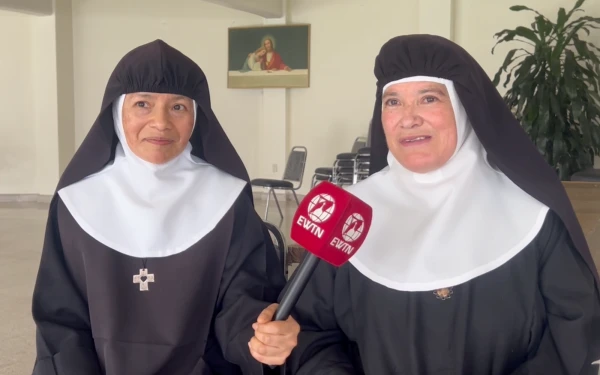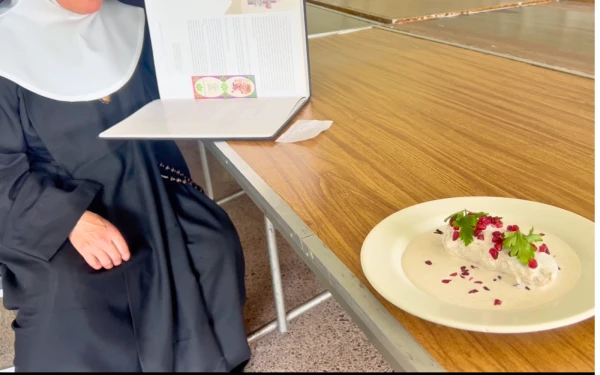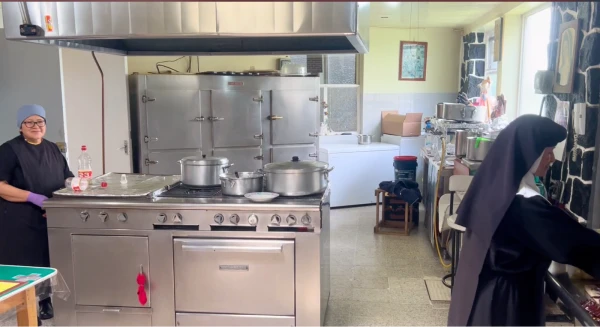During the national holidays, which are held in Mexico around September 16, it is common for the table to be engaged with a dish that evokes identity and tradition: Chile in Nogada. Its origin, however, goes beyond gastronomy; It was created by religious to celebrate a newly formed nation.
The Agustinas Recoletas emerged in Europe in the 16th century as a branch of the order of San Agustín, with the mission of leading a more austere life. In Mexico, the order was established in 1688 in the convent of Santa Monica, in the state of Puebla, which became the main house of the religious during the Viceroyalty of New Spain.
Receive the main news of ACI Press by WhatsApp and Telegram
It is increasingly difficult to see Catholic news on social networks. Subscribe to our free channels today:
On September 16, 1810, the struggle for the independence of Mexico began regarding Spain. Eleven years later, on September 27, 1821, the union of various insurgent and realistic forces headed by Agustín de Iturbide, consumed independence. Shortly after, Iturbide was proclaimed as the first emperor of the nascent Mexican nation.
The story that connects these religious with those decisive days, as reported in an interview with ACI Press the Agustinas Recoletas Tomasa Islas and Flor de María sisters, occurred in August 1821.

Before Agustín de Iturbide arrived in the capital, passed through Puebla after the signing of the Treaties of Córdoba, a document that formally declared the independence of Spain. It was then that the nuns of the convent decided to honor it with a dish.
That saucer, Chile in Nogada, was born from seasonal products. The Granada, the Poblano Chile and the Castilla nut were combined with the purpose of reflecting the colors of the trigrator army flag. Green was the Catholic faith, the white the independence of Mexico and the red the union between Americans and Europeans.
Thus, each ingredient became a living symbol of the new homeland, joining flavor and meaning on a plate.
Elaboration and tradition
The National Institute of Anthropology and History (INAH) documents that in 1934, After the definitive exclaustration of the nuns of Puebla in application of the reform laws, the convent became the first Sacred Art Museum in Mexico, dedicated to female religious life.
However, as sister Tomasa recalls, several religious brought the recipe to other convents, preserving the living tradition.
In 1939, five sisters from Puebla founded the convent of Our Lady of Consolation in Mexico City. “They already brought the recipe or the way of doing them. Now we continue with what they taught us,” explains the religious.

Chile in Nogada that they make today is a poblano chili stuffed with ground and fruit such as apple, pear and peach, bathed in nut sauce and decorated with grenade.
Beyond conserving tradition, Chile in Nogada has also become a source of income for the sisters, who make it and sell it during the season.
Maria’s sister explains that the preparation time varies according to the amount they make, although the process is generally five days, between the selection and cooking of the fruit, the seasoned of the meat and the preparation of the chiles.
The sister tells that her chiles in Nogada have even reached the tables of the cardinals of the primed archdiocese of Mexico, who were sent year after year before the pandemic. Even, as reported, the saucer became tasted by former president Felipe Calderón, who ruled the country from 2006 to 2012.
Prayer and silence in the kitchen
For Augustine, the kitchen is also a space to pray. Sor Tomasa explains that the mission of the Agustinas Recoletas “within the Church is prayer and all our tasks we do them for the world, for salvation and so that people are interested in knowing God more.”

He adds that during the preparation of their foods they usually pray “through Jaculatory, and from the morning we offer (to God) all our work.”
Silence is another pillar of his spiritual life: “We try to remain silent within work. Sometimes we do not complete it, but it is essential to live our charism and our spirituality.”
A call to respect religious freedom
Sister Tomasa Islands also remember that the national holidays are an ideal time for politicians to “approach our Lord.” Therefore, he called for “respecting religious freedom, that they do not bind those who work for good, unity and family.”

